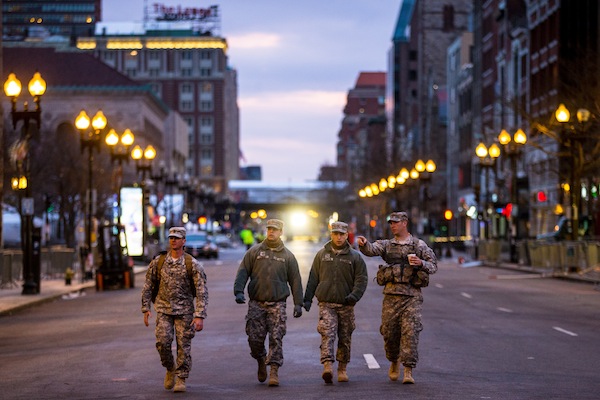The runners who will gather for the London Marathon this weekend will converge on the greatest target in the world. Winston Churchill was the first to see the problem. ‘With our enormous metropolis here… [we are] a kind of tremendous fat cow, a valuable cow tied up to attract the beasts of prey,’ he told the Commons in 1934. But ‘we cannot possibly retreat, we cannot move London.’ New enemies, from the IRA to al-Qa’eda, have come to do their worst — but since the London Underground bombing of 7 July 2005 none has succeeded. The average British urbanite would be forgiven for thinking the threat has subsided. It has not.
The atrocity at the Boston Marathon this week is a reminder that such threats never vanish — they just get intercepted. But as the IRA put it after the Brighton bomb, ‘remember we only have to be lucky once. You will have to be lucky always.’ The best minds in counter-terrorism would struggle to detect two bombs made from explosives packed in ordinary kitchen pressure cookers and hidden in rucksacks. Three days after the bombing the authorities had received 2,000 tips, but had no suspects. Barack Obama has said he is treating the two explosions as an ‘act of terrorism’ — but it is a strange form of terrorism. There is no suicide tape, no claim of responsibility and no fathomable motive.
Obama also said he wanted to find out ‘who did this and why’. That wish is unusually open-minded: George W. Bush wanted the perpetrators killed, rather than understood. But Obama’s point is sound: the threat mutates. The US authorities do not release data on how many plots have been foiled since 11 September 2001, but now and again the British spooks let us know. Jonathan Evans, the director-general of MI5, said in a speech last year that ‘Britain has experienced a credible terrorist attack plot about once a year since 9/11’. Some of the interceptions, such as the thwarting of the Heathrow airport plot, have been nothing short of spectacular, but they never seem that way, because the end result is that nothing happens.
Years of improving intelligence, infiltration and drone strikes have allowed the West to win the battle with al-Qa’eda. Osama bin Laden is dead, his group’s leadership in Afghanistan has been decapitated and the net is closing on the biggest single threat: the al-Qa’eda franchise in Yemen which was behind both the US-bound underpants bomb and the printer bomb found in an East Midlands airport. The Islamists in the Sahara desert, against whom David Cameron recently promised to fight a ‘generational struggle’, do not seem to reciprocate his attention and have at present no overseas ambitions. The era of global terror networks appears to be drawing to a close.
But attacks still come. Only last week, the final members of a Birmingham terror cell were found guilty of plotting to detonate eight bombs in the city. One of them, Irfan Khalid, had boasted that he wanted to create ‘another 9/11’ — we know this because the security services had somehow bugged his car. Both British and American security services have seen a sharp fall in would-be jihadis flying off to Pakistan to train, now that the chances of interception are far larger. There is more evidence of them following advice from the now-dead leader of al-Qa’eda in Yemen, Anwar al-Awlaki: do it anyway, tell a minimal amount of people.
The threat of improvised Islamist attacks is serious enough to have inspired the Birmingham plotters. It would result in precisely what we saw in Boston: smaller, cruder bombs. Self-radicalisation is far harder to track, especially if the chemicals are being extracted from sports injury cold packs (as was the case in the Birmingham plot).
As the threats change, the security services adapt with it. A few years ago, three in every four people being traced by MI5 were linked to Pakistan or Afghanistan. Now this is fewer than one in two. It is not just the rise of Africa-based terror groups but also the rise of home-grown enemies within. Developments in Northern Ireland, where the splinter groups have splinter groups, show that the Republican threat is evolving rather than dying. The renewed focus on so-called ‘lone wolf’ attackers is the latest trend in counter-terrorism.
If it emerges that the Boston bomb was the work of an American — similar to Timothy McVeigh, whose Oklahoma truck bomb was the biggest terrorist incident the US had experienced until 9/11 — then the British may draw the incorrect assumption that such madness could not happen here. Norway had no history of this, until Anders Breivik struck. There is already evidence that the disintegration of the British National Party has pushed people to violent extremes. The London nailbomber, David Copeland, was an ex-BNP member who wanted to advance a lunatic idea of racial purity. The rise of the lone wolf attacker is of just as much concern to the security services as the jihadi.
Public patience with security can wear thin when there have been no attacks. People may ask — for example — why the policing bill for Baroness Thatcher’s funeral was so large. The Royal United Services Institute has part of the answer: it keeps a record of potential terrorist plots on British soil and counts 43 since the Twin Towers were struck. After the tragedy at Boston, the police did not consider cancelling the London Marathon — and that decision did not arise from an arrogant assumption that nothing of the sort could happen here. It was a vote of confidence in our security services, and their ability to adapt as quickly as terrorism itself.






Comments